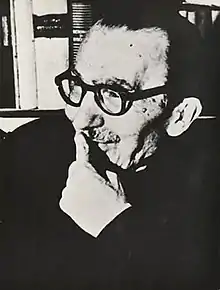Modern Greek literature
Modern Greek literature refers to literature written in common Modern Greek, emerging from the late Byzantine era in the 11th century AD. During this period, spoken Greek became more prevalent in the written tradition, as demotic Greek came to be used more and more over the Attic idiom and the katharevousa reforms.


The migration of Byzantine scholars and other émigrés during the decline of the Byzantine Empire (1203–1453) and mainly after the fall of Constantinople in 1453 until the 16th century is considered by some scholars as key to the revival of Greek and Roman studies and subsequently in the development of the Renaissance humanism[1] and science. These emigres were grammarians, humanists, poets, writers, printers, lecturers, musicians, astronomers, architects, academics, artists, scribes, philosophers, scientists, politicians and theologians.[2] They brought to Western Europe the far greater preserved and accumulated knowledge of their own civilization.
The Cretan Renaissance poem Erotokritos is undoubtedly the masterpiece of this early period of modern Greek literature, and represents one of its supreme achievements. It is a verse romance written around 1600 by Vitsentzos Kornaros (1553–1613). The other major representative of the Cretan literature was Georgios Chortatzis and his most notable work was Erofili. Other plays include The Sacrifice of Abraham by Kornaros, Panoria and Katsourbos by Chortatzis, Fortounatos by Markos Antonios Foskolos, King Rodolinos by Andreas Troilos, Stathis (comedy) and Voskopoula by unknown artists.
Much later, Diafotismos was an ideological, philological, linguistic and philosophical movement among 18th century Greeks that translate the ideas and values of European Enlightenment into the Greek world. Adamantios Korais and Rigas Feraios are two of the most notable figures. In 1819, Korakistika, written by Iakovakis Rizos Neroulos, was a lampoon against the Greek intellectual Adamantios Korais and his linguistic views, who favoured the use of a more conservative form of the Greek language, closer to the ancient.
The years before the Greek Independence, the Ionian islands became the center of the Heptanese School (literature). Its main characteristics was the Italian influence, romanticism, nationalism and use of Demotic Greek. Notable representatives were Andreas Laskaratos, Antonios Matesis, Andreas Kalvos, Aristotelis Valaoritis and Dionysios Solomos.
After the independence the intellectual center was transferred in Athens. A major figure of this new era was Kostis Palamas, considered "national poet" of Greece. He was the central figure of the Greek literary generation of the 1880s and one of the cofounders of the so-called New Athenian School (or Palamian School). Its main characteristic was the use of Demotic Greek. He was also the writer of the Olympic Hymn.
Modern Greek literature is usually (but not exclusively) written in polytonic orthography, though the monotonic orthography was made official in 1981 by Andreas Papandreou government. Modern Greek literature is represented by many writers, poets and novelists. Major representatives are Angelos Sikelianos, Emmanuel Rhoides, Athanasios Christopoulos, Kostis Palamas, Penelope Delta, Yannis Ritsos, Alexandros Papadiamantis, Nikos Kazantzakis, Andreas Embeirikos, Kostas Karyotakis, Gregorios Xenopoulos, Constantine P. Cavafy, Demetrius Vikelas, Georgios Vizyinos, while George Seferis and Odysseas Elytis have been awarded the Nobel Prize in Literature.
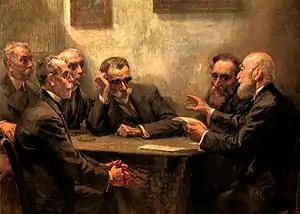
Other writers include Manolis Anagnostakis, Nicolas Calas, Georgios Drosinis, Kiki Dimoula, Maro Douka, Nikos Engonopoulos, Nikos Gatsos, Iakovos Kambanelis, Nikos Kavvadias, Andreas Karkavitsas, Kostas Krystallis, Dimitris Lyacos, Petros Markaris, Lorentzos Mavilis, Jean Moréas, Stratis Myrivilis, Zacharias Papantoniou, Dimitris Psathas, Ioannis Psycharis, Aristomenis Provelengios, Alexandros Rizos Rangavis, Vasilis Rotas, Miltos Sahtouris, Antonis Samarakis, Giannis Skarimpas, Dido Sotiriou, Georgios Souris, Alexandros Soutsos, Panagiotis Soutsos, Georgios Stratigis, Angelos Terzakis, Kostas Varnalis, Vassilis Vassilikos, Elias Venezis, Demetrios Bernardakis and Nikephoros Vrettakos.
Notable works
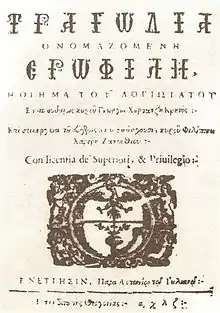
- Erofili (c.1600), drama by Georgios Chortatzis (noted by Palamas as the first work of modern Greek theatre)
- Erotokritos (c.1600), romance by Vitsentzos Kornaros
- Thourios or Patriotic hymn (1797) by Rigas Feraios
- Hymn to Liberty (1823) by Dionysios Solomos
- Lyrika/Lyrics (1826) by Andreas Kalvos
- The Free Besieged (1826–1844) by Dionysios Solomos
- History of the Hellenic nation (1860-1877) by Constantine Paparrigopoulos
- The Only Journey of His Life (1864), novel by Georgios Vizyinos
- The Papess Joanne (1866), novel by Emmanuel Rhoides
- History of Modern Greek Literature (1877) by Alexandros Rizos Rangavis
- Loukis Laras (1879), novel by Demetrius Vikelas
- Idou o anthropos (1886), by Andreas Laskaratos
- My Journey (1888) by Ioannis Psycharis, about the Greek language question
- The Murderess (1903), novel by Alexandros Papadiamantis
- Twelve Lays of the Gypsy (1907) by Kostis Palamas
- The Light-Shadowed (1909), poetry collection by Angelos Sikelianos
- The King's flute (1910) by Kostis Palamas
- Life in the Tomb (1923) by Stratis Myrivilis
- Number 31328 (1926), novel by Elias Venezis
- Elegies and Satires (1927), poetry collection by Kostas Karyotakis
- Strophe (1931), poetry collection by Giorgos Seferis
- Ipsikaminos (1935), surrealist collection by Andreas Embeirikos
- Epitafios (1936) by Yiannis Ritsos (melodized by Mikis Theodorakis)
- Aeoliki Gi (Aeolian land) (1943), novel by Elias Venezis
- Zorba the Greek (1946), novel by Nikos Kazantzakis
- God's Pauper: Saint Francis of Assisi (1953), by Nikos Kazantzakis
- The Last Temptation of Christ (1953), novel by Nikos Kazantzakis
- Captain Michalis (1953), novel by Nikos Kazantzakis
- Romiosini (1954), by Yiannis Ritsos (melodized by Mikis Theodorakis)
- Christ Recrucified (1954), novel by Nikos Kazantzakis
- To Axion Esti (1959), poetry collection by Odysseas Elytis (melodized by Mikis Theodorakis)
- Bloody Earth (1962), novel by Dido Sotiriou
- History of the European spirit (1966) by Panagiotis Kanellopoulos
- Z (1966) by Vassilis Vassilikos
- Eighteen Short Songs of the Bitter Motherland (1973), poetry collection by Yiannis Ritsos (melodized by Mikis Theodorakis)
- Z213: Exit (2009), by Dimitris Lyacos
Theatrical plays
- Achilleus or Death of Patroclus (1805) by Athanasios Christopoulos
- Babylonia (1836), comedy by Dimitris Vyzantios
- The Wedding of Koutroulis (1845), comedy by Alexandros Rizos Rangavis
- Maria Doxapatri (1853) by Demetrios Bernardakis
- Vasilikos (1859) by Antonios Matesis
- The secret of countess Valerena (1904) by Gregorios Xenopoulos
- Stella Violanti (1909) by Gregorios Xenopoulos
- Protomastoras (1910) by Nikos Kazantzakis (performed also as opera by Manolis Kalomoiris)
- Long Live Messolonghi (1927) by Vasilis Rotas
- Madam Sousou (1942), comedy by Dimitris Psathas
- Our Great Circus (1972) by Iakovos Kambanellis
Gallery
See also
References
- R. Beaton, An Introduction to Modern Greek Literature, Oxford University Press, 1999.
- M. Vitti, Ιστορία της Νεοελληνικής Λογοτεχνίας [History of Modern Greek Literature], ed. Οδυσσέας, Athens, 2003.
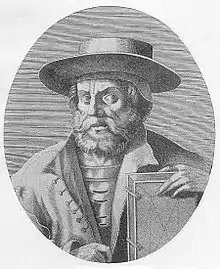




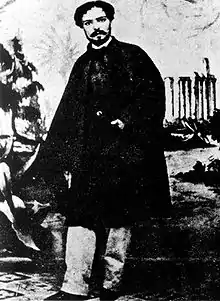

.JPG.webp)





